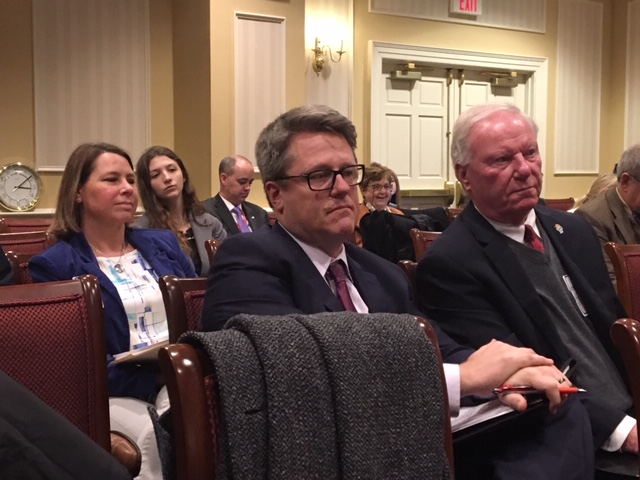Local Control vs. Economic Benefits at Center of Debate on School Start Dates

The mayor of Ocean City and other tourism boosters told a Maryland Senate panel Wednesday that a proposal to effectively overturn a school-year executive order from Gov. Lawrence J. Hogan Jr. would cost families valuable time together and lead to a drop-off in economic activity.
The warning came during a hearing before the Education, Health and Environmental Affairs Committee on Senate Bill 128, a measure backed by two powerful lawmakers that would give local boards of education the power to make school calendar decisions.
In 2016, Hogan (R) signed an executive order mandating that the first day of class in Maryland public schools occur after Labor Day. It was one of the most high-profile moves of his first term and was cheered by business owners and Comptroller Peter V.R. Franchot (D).
Sens. Paul G. Pinsky (D-Prince George’s), chairman of Education, Health and Environmental Affairs, and Nancy King (D-Montgomery), head of the Budget and Taxation Committee, insist they have nothing against the concept of starting school after Labor Day, but they want each school district to be able to decide the issue for themselves.
“School policy should not be a political football,” Pinsky told his committee. “I believe those closest to the community should make those decisions. Taking it out of the hands of the 24 jurisdictions two and a half years ago was then a political act. Now we have an opportunity to right that act.”
Pinsky said the proposal would not require school systems to start before Labor Day, it would simply grant authority to those that want to do so.
King, former president of the Montgomery County Board of Education, noted that different counties observe different religious holidays.
“Montgomery County added Ramadan as a holiday this past year because of the fact that we have so many Muslim students,” she said. “They don’t need to celebrate that holiday in Garrett County or Worcester County because they don’t have many Muslim residents.”
Six superintendents testified in favor of the measure.
They said they found it difficult to start school after Labor Day, find the 180 days of classroom instruction mandated by state law and end the year by the June 15 date established by Hogan’s executive order. The challenge, they testified, is particularly acute when they are forced to cancel class due to inclement weather.
Ocean City Mayor Richard W. Meehan told the panel that room tax receipts have increased 7 percent since Hogan’s order.
“As you go around Ocean City that week prior to Labor Day, what you see is what you didn’t see before — Maryland license plates,” he said.
He said many families take multi-generational vacations, giving children valuable time with grandparents.
“You know how important that is in today’s world? Probably more important than ever,” he said. “And maybe more important than a couple days in a classroom. … There is certainly a social advantage to this and something that is extremely important.”
Julianna Brightman, a lobbyist representing the Maryland Hotel and Lodging Association, an organization with members around the state, implored lawmakers to leave Hogan’s order in place.
“Please do not put an end to an initiative that is just beginning to benefit tourism and families across the state of Maryland,” she said.
Chris Riehl, an official with the Maryland Tourism Coalition, noted that a bipartisan task force created by former Gov. Martin O’Malley (D) studied the issue and recommended that the school year begin after Labor Day.
Despite the pleas, several members of the panel seemed inclined the support the Pinsky-King measure.
“I think there is evidence that it’s not beneficial to arbitrarily tell educators when they can educate,” Sen. Ron Young (D-Frederick) told a group of witnesses opposed to the bill. “We all have to be flexible.”
Educators told the committee that their early efforts to craft calendars for the 2020-2021 school year are already running into difficulty because Labor Day is Sept. 7, meaning school — under the current rules — can’t begin until Tuesday, Sept. 8. The 2021-2022 calendar poses similiar challenges.
Sen. Mary Beth Carozza (R-Lower Shore), who represents Ocean City, said there are “more pressing educational issues” in Maryland than when the school year should begin.
Franchot’s Chief of Staff Len Foxwell told the panel that the move to a post-Labor Day start to the school year has consistently polled well with the public.
“This is not a choice between education and business,” he said. “We need the success of the latter to ensure the success of the former.”
King has introduced a second bill, Senate Bill 131, that “clarifies” legislation from a prior session giving school districts the right to add five days to the end of the school calendar in June. The use of those days need not be just to make up for snow days, King testified. They can be for any reason a local board of education chooses to use them.
After the hearing, Foxwell said he expects SB 128 to breeze through the Senate. He said the comptroller’s office will “redouble our efforts” to block it in the House of Delegates.




 Creative Commons Attribution
Creative Commons Attribution